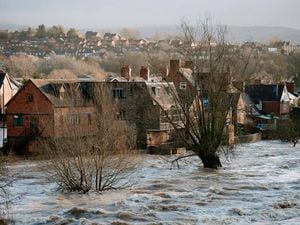Extent of sewage pollution in south Shropshire rivers revealed
Sewage was being spilled into rivers in south Shropshire by water companies for more than 321 days last year, new figures show.

Rives in the area were polluted for a total of 7,721 hours - the equivalent of 88 per cent of the entire year - as a result of 72 discharges from water treatment works.
The new data shows why action is needed to clean up rivers in south Shropshire, according to the area's MP Philip Dunne.
The statistics have come to light as Mr Dunne has introduced a Private Member’s Bill to place a duty on water companies to ensure that untreated sewage is not discharged into rivers and other inland waters.
The statistics include 301 spillages from the Combined Sewer Overflows in Bridgnorth and Quatford into the River Severn for a total duration of 960 hours.
The Severn was also affected by spillage into tributary waterways at Broseley for 256 hours through 128 separate spills.
Meanwhile sewage entered the River Teme at Ludlow on 181 occasions, for a combined total of 1,768 hours.
The River Teme was also affected at Burford, where 150 spillages took place for a total of 1,886 hours.
Smaller rivers were also affected last year, with Borle Brook badly affected at Highley where 79 spillages polluted the water for a total of 1,179 hours, while the River Clun was also affected at the town on 56 occasions for a total of 570 hours.
Both the River Severn and River Worfe have been classified as in ‘poor’ ecological condition under the Water Framework Directive from the Environment Agency, with the Worfe affected by sewage spills 108 times for a total of 1,812 hours last year.
The River Rea is classed as in ‘bad’ ecological condition.
'Unacceptable'
Mr Dunne said the extent of the problem could be even more wide-reaching, given this data has been extracted only from what has been admitted publicly by water companies, some of which have been more reluctant than others to acknowledge the true extent of spillage.
The Conservative MP said: “Strolling along a riverbank in South Shropshire, or looking over a bridge in one of our towns, you might not be aware of the huge problem of sewage spilling into our local rivers.
"But 7,721 hours of spillage in our local rivers occurred in just the last year alone.
"In fact I suspect the actual amount of spillage may be higher, as the current system of event monitoring across the country leaves a lot to be desired.

"While much of this happens at the same time when it rains, it is equivalent to a spillage happening somewhere in South Shropshire for 88 per cent of the year.
"Water companies are licensed to spill so there is a release mechanism intended to be used for exceptional storms, but now it has become routine – virtually whenever it rains.
"Clearly, this is completely unacceptable, and sewage spills need to stop.
"I am determined to clean up the state of our rivers, not only here in South Shropshire, but across the whole country.
"So I am asking the public to check if their MP is backing my bill, and if not, to ask them why.
"I am delighted to have the support of more than 80 MPs so far with broad cross-party interest, but we shall need many more to have a chance of this bill becoming law.”
Mr Dunne added: “I am calling on local councils to check the information which has been published for the first time on the website supporting my campaign, and move a motion in support of my Sewage (Inland Waters) Bill.”
The bill will have its Second Reading on January 15.
It has received support so far from The Rivers Trust, The Angling Trust, Surfers Against Sewage, Wildlife Trusts, Wildlife & Countryside Link, RSPB, Salmon & Trout Conservation, Freshwater Habitats, Bug Life, Waterkeeper Alliance, London Waterkeeper, Windrush Against Pollution, Sewage Free Swimmers, Blue Marine Foundation, Outdoor Swimming Society, British Canoeing, Royal Lifesaving Society, Marinet UK, and the Institute of Fisheries Management.





